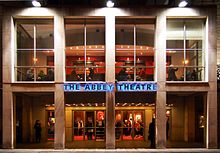Abbey School of Actors
| Ireland's National Theatre | |

Front facade
|
|
| Address | 26 Lower Abbey Street Dublin Republic of Ireland |
|---|---|
| Coordinates | 53°20′54″N 6°15′26″W / 53.348333°N 6.257222°W |
| Owner | Abbey Theatre Limited (prev. National Theatre Society) |
| Designation | National Theatre of Ireland |
| Capacity | 492 |
| Construction | |
| Opened | 1904 |
| Rebuilt | 1966 |
| Architect | Michael Scott |
| Website | |
| abbeytheatre.ie | |
The Abbey Theatre (Irish: Amharclann na Mainistreach), also known as the National Theatre of Ireland (Irish: Amharclann Náisiúnta na hÉireann), in Dublin, Republic of Ireland, first opened its doors to the public on 27 December 1904. Despite losing its original building to a fire in 1951, it has remained active to the present day. The Abbey was the first state-subsidized theatre in the English-speaking world; from 1925 onwards it received an annual subsidy from the Irish Free State. Since July 1966, the Abbey has been located at 26 Lower Abbey Street, Dublin 1.
In its early years, the theatre was closely associated with the writers of the Irish Literary Revival, many of whom were involved in its founding and most of whom had plays staged there. The Abbey served as a nursery for many of the leading Irish playwrights and actors of the 20th century, including William Butler Yeats, Lady Gregory, Seán O'Casey and John Millington Synge. In addition, through its extensive programme of touring abroad and its high visibility to foreign, particularly American, audiences, it has become an important part of the Irish tourist industry.
The Abbey arose from three distinct bases, the first of which was the seminal Irish Literary Theatre. Founded by Lady Gregory, Edward Martyn and W. B. Yeats in 1899—with assistance from George Moore—it presented plays in the Antient Concert Rooms and the Gaiety Theatre, which brought critical approval but limited public interest.
The second base involved the work of two Dublin directors, William and Frank Fay. William worked in the 1890s with a touring company in Ireland, Scotland and Wales, while his brother Frank was involved in amateur dramatics in Dublin. After William returned to Dublin, the Fay brothers staged productions in halls around the city and eventually formed W. G. Fay's Irish National Dramatic Company, focused on the development of Irish acting talent. In April 1902, the Fays gave three performances of Æ's play Deirdre and Yeats' Cathleen Ní Houlihan in a hall in St Theresa's Hall on Clarendon Street. The performances played to a mainly working-class audience rather than the usual middle-class Dublin theatregoers. The run was a great success, thanks in part to the beauty and force of Maud Gonne, who played the lead in Yeats' play. The company continued at the Antient Concert Rooms, producing works by Seumas O'Cuisin, Fred Ryan and Yeats.
...
Wikipedia

